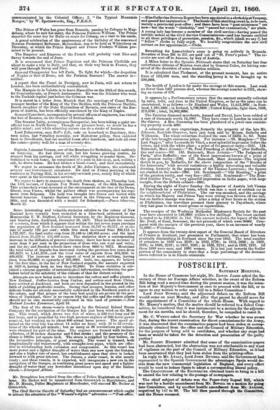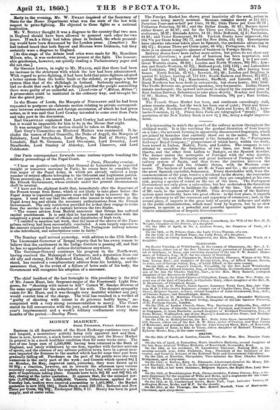POSTSCRIPT • SATURDAY Mosaawa.
In the House of Commons last night, Mr. EDWIN JAMES asked the Se- cretary of State for Foreign Affairs whether, in the event of the Reform Bill being read a second time during the present session, it was the inten- tion of her Majesty's Government at once to proceed with the bill, or to agree to any motion to refer such bill to a Select Committee ?
Lord Joule Ressmst said the adjourned debate on the Reform Bill would come on next Monday, and after that passed he should move for the appointment of a Committee of the whole House. With regard to Mr. Massey's motion, that the matter should be referred to a Select Com- mittee, he considered that it was tantamount to a motion for the adjourn- ment for six months, and he should, therefore, be compelled to resist it.
Mr. C. WYNNE asked the Secretary for War whether he was aware that, during the recent examination for direct commissions for the Army, it was discovered that the examination-papers had been stolen or surrep- titiously obtained from the office and the Council of Military Education, for the purpose of being sold to candidates, and whether any steps had been or would be taken for the detection and prosecution of the guilty parties ?
Mr. SIDNEY HERBERT admitted that some of the examination-papers had been abstracted, but the abstraction was not attributable to any want of vigilance on the part of the Council of Military Education, as it had been ascertained that they had been stolen from the printing-office.
In reply to Mr. LYA.LI, Lord Jonas Rnssart said the Government had represented to the Spanish Government the advantages Spain would de- rive from the new commercial legislation of England, and every effort would be used to induce Spain to adopt a corresponding liberal policy.
The CRA-NCELLOR of the EXCHEQUER obtained leave to bring in a bill to amend the law relating to the postage of newspapers.
The chief subject of debate was the Paper-duty Repeal Bill, which was met by a hostile amendment from Mr. Boortr. on a motion for going into Committee, and by another hostile amendment from Mr. Aenrow, negatived by 147 to 39. The bill then passed through the Committee, and the House resumed.
Early in the evening, Mr. W. Ewaar inquired of the Secretary of State for the Home Department what was the state of the law with respect to prize-fighting. He objected to these fights as a national institution.
Mr. V. Seurxv thought it was a disgrace to the country that two men in England should have been allowed to pommel each other for two hours. If an& a thing had taken place in Ireland, the whole proceed- ing would have been denounoed by the London press. (Laughter.) He had indeed heard that both Sayers and Heenan were Irishmen, but they certainly were a disgrace to England. [At this stage of the debate loud cries were made for Mr. Monckton Manes, who, it was understood, was present at the fight. The honour- able gentleman, however, sat quietly reading a Parliamentary paper and did not rise.] Sir GEORGE LEWIR, in reply to Mr. MTLEFE, said that there had been no increase in the strictness with which the law had been administered. With regard to prize-fighting, it had been held that prize-fighters adopted a better system than the bowie *knife or the stiletto, or perhaps a better system than that of the shillelagh in Ireland. Seriously speaking, he had no doubt that such a fight was illegal, and that the people assembling there were guilty of an unlawful act. (Loud cries of ",Mines, ifilnes.") A prosecution could be instituted in the ordinary way, and brought be- fore the grand jury.
In the House of Lords, the Marquis of Nonmannv said he had been requested to postpone an elaborate motion relating to private correspond- ence between ambassadors and foreign secretaries, of which he had given notice, as it was said that Lord Cowley intended to come over from Paris and take part in the discussion.
Earl GRANVILLE explained that Lord Cowley had arrived in London, but it would be impossible for him to be in the House that night.
It was arranged that the motion should be taken on Monday. Earl Grey's Committee on Electoral Matters was nominated. It in- cludes the names of Earl Granville, the Duke of Argyll, the Marquis of Salisbury, Lord Stmtheden, Lord Belper, the Earl of Derby, Lord Lonsdale, Earl St, Germans, Lord Overstone, Lord Everaley, Lord Stradbroke, Lord Stanley of Alderley, Lord Llanover, and Lord Colchester.



























 Previous page
Previous page